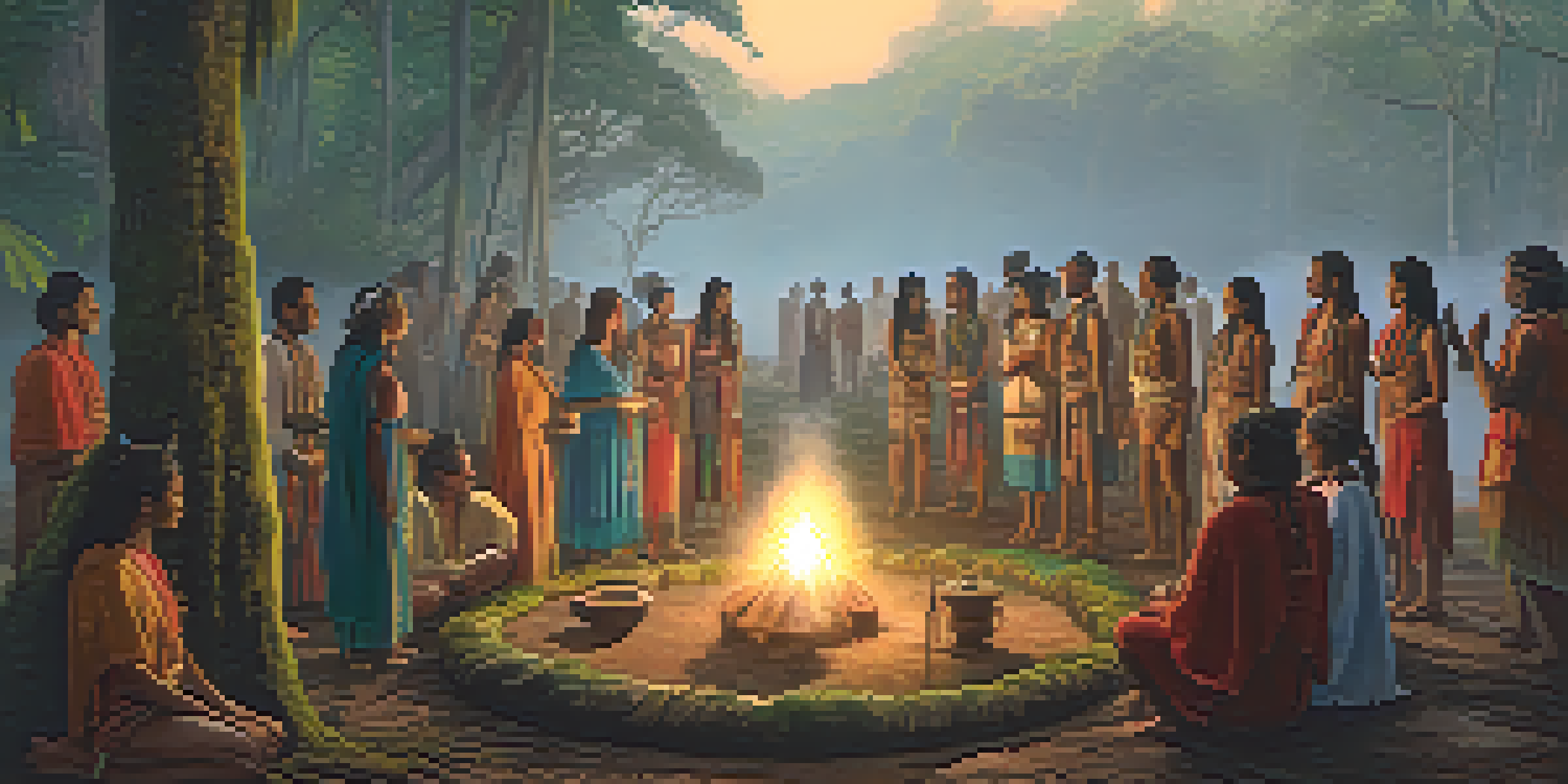Psychedelic Sacraments: The Use of Ayahuasca in Healing Rituals

Understanding Ayahuasca: A Brief Overview
Ayahuasca is a powerful brew originating from the Amazon rainforest, traditionally used by indigenous tribes for spiritual and healing purposes. Made from the Banisteriopsis caapi vine and other plants, it contains DMT, a potent psychedelic compound. The experience is often described as a journey that can lead to profound insights and emotional healing.
The experience of Ayahuasca can lead to profound insights and emotional healing.
In recent years, Ayahuasca has gained popularity beyond its traditional roots, attracting people from all walks of life seeking personal transformation. This rising interest has led to an increase in Ayahuasca retreats, often set in picturesque natural locations where participants engage in guided ceremonies. Understanding its cultural significance is essential for anyone considering this journey.
The use of Ayahuasca in healing rituals is not just about the substance itself; it's about the entire experience, including the context and community surrounding it. As we delve deeper into the healing aspects of Ayahuasca, we’ll explore how these rituals can foster a sense of connection and support.
The Role of Ritual in Ayahuasca Ceremonies
Ritual plays a crucial role in Ayahuasca ceremonies, providing structure and intent to the experience. These rituals often include music, prayers, and guided meditations, all designed to create a safe and sacred space for participants. The presence of experienced shamans or facilitators helps to navigate the psychedelic experience, ensuring that participants feel supported throughout their journey.

During the ceremony, participants often share their intentions, which can range from healing trauma to seeking clarity in their lives. This communal aspect fosters a sense of belonging, which can be incredibly healing in itself. As participants collectively enter the Ayahuasca experience, they often find comfort in knowing they are not alone.
Ayahuasca's Healing Power
Ayahuasca can facilitate profound emotional healing and personal transformation through guided ceremonies.
The combination of individual and collective experiences during the ritual can lead to transformative insights, promoting emotional and spiritual growth. The rituals, steeped in tradition, serve as a bridge between the physical and spiritual realms, enhancing the overall healing potential of Ayahuasca.
Healing Through Connection: Community in Ayahuasca
One of the most remarkable aspects of Ayahuasca ceremonies is the sense of community they cultivate. Participants often form deep bonds, sharing their struggles and triumphs, which fosters a supportive environment. This connection can be a vital part of the healing process, as it allows individuals to feel understood and validated.
Healing is often a collective journey, where the bonds we form can be as important as the individual experiences.
In many cases, the shared experience of Ayahuasca leads to lasting friendships that extend beyond the retreat. This community support can be invaluable when participants return to their daily lives, providing a network of like-minded individuals who understand their journey. The importance of such connections cannot be overstated, as they can help individuals integrate their experiences.
Moreover, the communal aspect of these rituals highlights the interconnectedness of all participants, reinforcing the idea that healing is often a collective journey. This sense of belonging can help alleviate feelings of isolation and loneliness, paving the way for deeper healing.
The Therapeutic Benefits of Ayahuasca
Research into the therapeutic benefits of Ayahuasca is still in its early stages, but initial findings are promising. Many participants report significant improvements in mental health conditions, such as depression, anxiety, and PTSD, after undergoing Ayahuasca ceremonies. These reports suggest that the psychedelic experience may facilitate emotional release and provide new perspectives on enduring challenges.
The process of confronting difficult emotions during the Ayahuasca experience can lead to profound healing. Many participants describe feelings of catharsis as they confront and process past traumas, which can result in a lighter emotional burden. This therapeutic aspect of Ayahuasca is often complemented by the integration support provided after the ceremony.
Community Enhances Healing
The communal aspect of Ayahuasca ceremonies fosters deep connections among participants, which can significantly aid in the healing process.
While individual experiences vary, the potential for Ayahuasca to serve as a catalyst for healing is gaining recognition. As more people seek alternative healing methods, Ayahuasca may offer a unique approach to addressing deep-rooted psychological issues.
Challenges and Considerations with Ayahuasca Use
While Ayahuasca can be transformative, it’s essential to approach it with caution and respect. The experience can be intense, often leading to challenging emotional and physical reactions. It's crucial for participants to be mindful of their mental and physical health, as well as their intentions for joining a ceremony.
Not everyone is suited for Ayahuasca, particularly those with certain medical conditions or a history of severe mental health issues. Therefore, thorough screening and consultation with healthcare professionals are vital before participating. Additionally, finding a reputable and experienced shaman or facilitator can significantly impact the safety and outcome of the experience.
Moreover, the commercialization of Ayahuasca retreats has raised ethical concerns about the authenticity of experiences offered. Participants should remain vigilant and prioritize their well-being by choosing retreats that emphasize safety, respect, and genuine connection to indigenous traditions.
Integrating Ayahuasca Experiences into Daily Life
Integration is a crucial aspect of the Ayahuasca journey, as it allows individuals to make sense of their experiences and apply insights to their everyday lives. Many participants find that journaling, therapy, or support groups can aid in processing their experiences after the ceremony. This reflection helps solidify the lessons learned during the ritual, fostering long-term growth.
Building a consistent practice of mindfulness, meditation, or other spiritual practices can also enhance the integration process. Engaging in these practices helps individuals stay connected to the insights gained during Ayahuasca ceremonies, allowing for deeper self-awareness. The journey doesn’t end with the ceremony; rather, it evolves into a continuous path of healing and personal development.
Integration is Key
Successfully integrating Ayahuasca experiences into daily life is crucial for maintaining the insights and growth achieved during the ceremonies.
Moreover, sharing experiences with others who have undergone similar journeys can create a supportive dialogue, helping participants feel less isolated. Engaging with community resources can further facilitate the integration process and provide a sense of continuity in their healing journey.
The Future of Ayahuasca in Healing Practices
As interest in alternative healing methods grows, Ayahuasca is gaining recognition in mainstream discussions about mental health and wellness. Researchers and practitioners are exploring its potential benefits, paving the way for more comprehensive studies. This could lead to a greater understanding of how Ayahuasca can complement traditional therapies.
The integration of Ayahuasca into therapeutic practices also raises questions about cultural appropriation and ethical considerations. It’s vital for practitioners to approach Ayahuasca with respect for its indigenous roots, ensuring that the practices are honored and not exploited. Building partnerships with indigenous communities can help guide this process.

Looking ahead, Ayahuasca may play a significant role in shaping the future of holistic healing practices. As we continue to explore its potential, it’s essential to approach Ayahuasca with openness, curiosity, and a commitment to ethical practices.